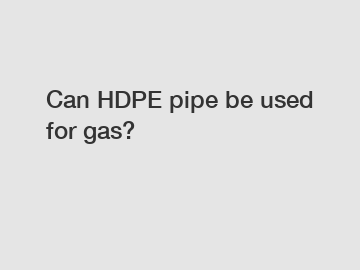Can HDPE pipe be used for gas?
In the world of pipes and pipelines, High-Density Polyethylene (HDPE) has been gaining significant attention for its versatility, durability, and cost-effectiveness. Commonly used in the transportation of water, its unique properties have sparked plenty of debates regarding its suitability for other applications – notably, gas pipelines. In this article, we aim to delve into the subject and shed light on the question: Can HDPE pipe be effectively used for gas?
1. The Growing Popularity of HDPE Pipe:
HDPE pipes have gained immense popularity due to their exceptional characteristics. HDPE pipes are resistant to corrosion, abrasion, and degradation from chemicals, making them ideal for a wide range of applications. Their flexible yet sturdy nature allows for easier installation and maintenance, reducing overall costs. Such benefits have driven their extensive application in the water supply industry. However, the question remains: are these pipes equally viable for gas transmission?

2. Understanding the Challenges of Gas Transmission:
Unlike water, gas transmission poses distinct challenges due to the nature of the substance being transported. Gas is more volatile, requiring greater safety precautions, and necessitating a stringent focus on leak prevention. To ensure a seamless gas transmission system, several factors must be considered, such as pressure rating, material compatibility, and joint integrity. These factors play a pivotal role in determining whether HDPE pipes can meet these requirements.
3. HDPE Pipes and the Gas Industry:
While traditionally, steel pipes have been the preferred choice for gas transmission, HDPE pipes have shown promise in recent years. Extensive research and advanced technology have led to the development of specialized HDPE pipe grades suitable for gas applications. These pipes exhibit improved strength, increased resistance to crack propagation, and enhanced durability. Their flexibility helps absorb vibrations and seismic movements, ensuring a more resilient gas transmission network.
4. The Advantages of HDPE Pipes for Gas Transmission:
a) Safety First: HDPE pipes have excellent resistance to slow crack growth and fatigue, minimizing the risk of pipeline failure and leaks. Moreover, their fusion-welded joints provide a secure and leak-free connection, reducing the chances of gas leakage.
b) High Flow Capacity: HDPE pipes have a smooth interior surface, enabling the efficient transportation of gas. This streamlined design minimizes pressure drop and allows for a higher flow capacity, reducing energy consumption and operational costs.
c) Corrosion Resistance: Unlike metallic pipes, HDPE pipes are immune to corrosion, eliminating the need for expensive and time-consuming corrosion prevention measures. This contributes to a longer lifespan and reduced maintenance requirements.
d) Enhanced System Integrity: HDPE pipes' flexibility and ductility help withstand ground movement and shifting conditions, ensuring long-term system integrity. This makes them particularly valuable in areas prone to seismic activities.
e) Cost-Effective Solution: HDPE pipes offer cost advantages over traditional steel pipes, both during installation and maintenance. Their lightweight nature reduces transportation and labor costs, and their extended lifespan translates into lower replacement and repair expenses.
5. Regulatory Compliance and Industry Standards:
The gas industry operates under strict regulations to ensure the safety and reliability of transmission systems. HDPE pipe manufacturers adhere to comprehensive quality standards and rigorous testing protocols to meet these requirements. Industry authorities closely monitor and certify HDPE pipes intended for gas transmission, ensuring consumers can trust in their performance.
Conclusion:
As technology and innovation continue to advance, HDPE pipes have become a robust alternative for gas transmission. Their suitability for this purpose is backed by extensive research, improved manufacturing techniques, and adherence to industry standards. Embracing HDPE pipes for gas transmission offers several advantages, including enhanced safety, increased flow capacity, and cost-effectiveness. While challenges remain, the effectiveness of HDPE pipes in gas transmission is becoming widely recognized by industry experts. It is undoubtedly an exciting time for HDPE pipes, as they continue to shape the future of reliable and efficient gas transportation networks.
The company is the world’s best HDPE Double Wall Corrugated Pipes, hdpe pipe gas, what is hdpe pipe used for supplier. We are your one-stop shop for all needs. Our staff are highly-specialized and will help you find the product you need.

Comments